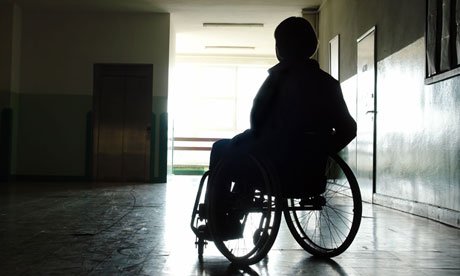
By John Pring Disability News Service 22nd March 2018
The equality and human rights watchdog has written to 13 NHS primary care organisations to warn them about discriminatory policies that could see service-users with complex healthcare needs forced into institutions.
The letters from the Equality and Human Rights Commission (EHRC) to 13 clinical commissioning groups (CCGs) across England are the first step in a potential judicial review of their policies on NHS continuing healthcare (NHS CHC).
Concerns about the NHS CHC policies of more than 40 CCGs were first raised in January 2017 by disabled campaigner Fleur Perry, herself a recipient of NHS continuing healthcare, which provides long-term NHS funding for care outside hospital.
Perry’s research, using freedom of information requests, showed how many CCGs had drawn up policies that suggested they would move disabled people eligible for NHS CHC out of their homes and into institutions against their wishes, even if the cost of a homecare package was only slightly more expensive than residential care.
These concerns were subsequently taken on by EHRC, which raised “significant concerns” about the policies in October when it asked 43 CCGs for more information.
EHRC said it believes that “blanket” NHS CHC policies that have imposed “arbitrary” caps on funding and fail to consider the specific needs of individual patients are “a serious breach” of the Human Rights Act, the CCGs’ public sector equality duty and the Department of Health and Social Care’s own NHS CHC framework.
If the CCGs fail to provide evidence to demonstrate their policies are lawful, or do not take steps to review them, they will be taken to court, the commission said this week.
Perry said the EHRC legal action was “fantastic”.
She said: “Under the Human Rights Act, interference with private and family life has to be taken into consideration and weighed up against other factors, including cost.
“Using a blanket cost-cap without thinking about what the impact would be for each and every person does not seem to allow room for this and could be unlawful.
“The idea that these policies mean that someone could take away your decision on where to live and who to live with without even meeting you is quite scary.
“It’s going to be a while before we’ll know the final outcome.
“For now, I think we need to have some conversations about what good practice looks like and how we can work together to make it happen, and how to make sure independent living is always explored as an option.”
The EHRC announcement came as lawyers for father-of-four Naphtali Denderowicz applied for a judicial review of the failure of Manchester CCG – not one of the 13 targeted by EHRC – to provide enough NHS CHC funding to enable him to be discharged from hospital and receive ongoing care at home.
Denderowicz, who is now tetraplegic after falling ill on holiday in Israel in May 2016, was told in May 2017, a year after he was flown home by air ambulance, that he qualified for NHS CHC funding, but only enough to fund a place in a care home.
Nine months on, he is still an in-patient at Salford Royal Hospital, where doctors have refused to discharge him unless a 24-hour care package is put in place.
Denderowicz said: “My current situation is very distressing for not only me, but my wife and our four children as well.
“When we first discussed the idea of me moving home in March last year, the CCG got estimated costs from numerous agencies, so they were aware of the type of budget that was necessary.
“For them to do the research to get to the desired outcome of me moving home, and then offer me a significantly lower budget than is needed has left me feeling very frustrated and angry.”
His lawyer, Mathieu Culverhouse, from Irwin Mitchell, said: “By failing to offer an appropriate budget for Mr Denderowicz’s home care, we believe the CCG [is] preventing him from maintaining his family life, which is of paramount importance to him, by not permitting him to move home to live with his wife and children.
“We will be raising human rights law arguments to help secure the care he needs.”
A Manchester CCG spokeswoman said: “We can’t make any comment as the matter is currently subject to legal proceedings.”
Rebecca Hilsenrath, EHRC’s chief executive, commenting on the letters to the 13 CCGs, said: “It is utterly unacceptable that anyone should be forced into residential care when they are healthy enough to live independently and with their families. And it doesn’t make sense for individuals or communities.
“A ‘one-size-fits-all’ approach will never properly address every single individual’s healthcare needs, and NHS CHC policies are no different.
“This is another example of individuals being disabled by society, and prevented from living as full and independent lives as possible, as is their right.
“We will use our powers to ensure that the NHS thinks about this again.”
Following the letters sent in October, almost a quarter of the 43 CCGs agreed to review their policies, while the commission will be writing again to others whose policies are of less concern.
But it is now set to use its powers to begin judicial review proceedings against 13 CCGs that the commission believes “have not considered their human rights and equality responsibilities in the way they operate their policies”.
The 13 CCGs have just 14 days to respond to the EHRC letter.
*EHRC is writing to the following CCGs: Brent, Coventry and Rugby, Dudley, East and North Hertfordshire, Eastern Cheshire, Harrow, Hillingdon, South Cheshire, Vale Royal, West Cheshire, Warwickshire North, Lincolnshire West, and Redditch and Bromsgrove
